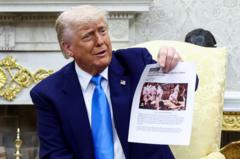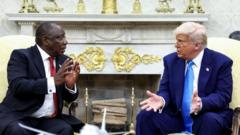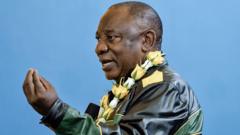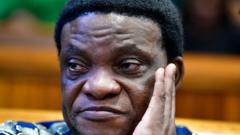Amid a pressurized Oval Office visit, President Ramaphosa tactfully addresses President Trump's provocative inquiries regarding alleged "white genocide" in South Africa, maintaining his composure while under scrutiny.
Trump's Tactics Under Fire: Ramaphosa Stays Composed Amid Provocations

Trump's Tactics Under Fire: Ramaphosa Stays Composed Amid Provocations
In a high-stakes meeting, South Africa's President Cyril Ramaphosa displays resilience against President Donald Trump's controversial claims.
In a highly publicized meeting that highlighted differing opinions on sensitive political issues, President Donald Trump subjected South Africa’s Cyril Ramaphosa to a barrage of unexpected queries and visual projections. Three months into Trump's second term, the meeting attracted attention due to its seemingly scripted nature, raising questions about Trump's harsh treatment of foreign dignitaries.
The meeting commenced with what could be termed a cordial discussion; however, it swiftly shifted when a journalist asked Trump about his belief concerning the debunked claims of white genocide in South Africa. Ramaphosa encouraged Trump to "listen to the voices of South Africans." In response, Trump called for the lights to be dimmed, displaying potentially misleading video clips that attempted to depict the perceived persecution of white South Africans, reminiscent of how he addressed Ukraine’s Zelensky earlier in the year.
The footage, featuring South African political leaders using incendiary language, became a point of contention during the meeting. Observers noted that while Ramaphosa had previously signed legislation permitting land expropriation without compensation, the law's implementation had yet to take effect. In his defense, Ramaphosa distanced himself from the radical sentiments shown in the video.
Interestingly, the South African delegation included well-known golfers Ernie Els and Retief Goosen, an unusual but strategic move in an attempt to cushion Ramaphosa from Trump's notorious confrontational approach. It appeared that Trump enjoyed the presence of the golfers, who offered their perspectives amid escalating tension. Ramaphosa, however, deftly sidestepped many of Trump's remarks, quipping that if genocide truly existed, the prominent attendees would not be present.
As Trump continued to emphasize the challenges faced by white farmers in South Africa, Ramaphosa maintained a diplomatic posture, framing the conversation around unity rather than division. His deft handling of the meeting showcases a developing framework for tackling contentious issues on the international stage while navigating the complex dynamics of domestic politics in the U.S.
In the backdrop, Trump's performance underscored his ongoing appeal to a base eager to rally around perceived injustices, prompting analysts to ponder whether adjustments are needed in his approach to dealing with international leaders moving forward.
The meeting commenced with what could be termed a cordial discussion; however, it swiftly shifted when a journalist asked Trump about his belief concerning the debunked claims of white genocide in South Africa. Ramaphosa encouraged Trump to "listen to the voices of South Africans." In response, Trump called for the lights to be dimmed, displaying potentially misleading video clips that attempted to depict the perceived persecution of white South Africans, reminiscent of how he addressed Ukraine’s Zelensky earlier in the year.
The footage, featuring South African political leaders using incendiary language, became a point of contention during the meeting. Observers noted that while Ramaphosa had previously signed legislation permitting land expropriation without compensation, the law's implementation had yet to take effect. In his defense, Ramaphosa distanced himself from the radical sentiments shown in the video.
Interestingly, the South African delegation included well-known golfers Ernie Els and Retief Goosen, an unusual but strategic move in an attempt to cushion Ramaphosa from Trump's notorious confrontational approach. It appeared that Trump enjoyed the presence of the golfers, who offered their perspectives amid escalating tension. Ramaphosa, however, deftly sidestepped many of Trump's remarks, quipping that if genocide truly existed, the prominent attendees would not be present.
As Trump continued to emphasize the challenges faced by white farmers in South Africa, Ramaphosa maintained a diplomatic posture, framing the conversation around unity rather than division. His deft handling of the meeting showcases a developing framework for tackling contentious issues on the international stage while navigating the complex dynamics of domestic politics in the U.S.
In the backdrop, Trump's performance underscored his ongoing appeal to a base eager to rally around perceived injustices, prompting analysts to ponder whether adjustments are needed in his approach to dealing with international leaders moving forward.




















